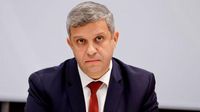In a controversial move, Jens Spahn, the deputy leader of the CDU/CSU parliamentary group, has called for a reevaluation of how the Bundestag interacts with the far-right Alternative for Germany (AfD). Following the AfD's strong performance in the recent February 2025 elections, where it emerged as the second strongest party in the Bundestag, Spahn suggested treating the AfD similarly to other opposition parties in parliamentary procedures.
Speaking to the Bild newspaper, Spahn emphasized the need for a balanced approach, stating, "I recommend that we find the right mix, not to let ourselves be provoked, to not jump over every stick that is held out." He acknowledged that the AfD's strength in parliament reflects a significant voter base, saying, "They sit there so strong because voters wanted to say something to us." This acknowledgment of the AfD's electoral support has sparked a wave of criticism from various political factions.
Since its entrance into the Bundestag in 2017, the AfD has faced significant barriers, failing to secure a Vice President position due to a lack of majority support from other parties. Additionally, it has not been granted a seat on the Parliamentary Control Committee, which oversees the secret services, nor has it held any chair positions in parliamentary committees in recent years. This exclusion has raised questions about the AfD's legitimacy as a parliamentary party.
Spahn's comments drew immediate backlash from the Green Party, with parliamentary manager Irene Mihalic asserting that the AfD is not just another opposition party. "The AfD is a party that is at least partially right-wing extremist, and some of its members maintain vital contacts with the violent right-wing extremist scene," Mihalic stated. She urged the CDU to clarify its relationship with the AfD unequivocally, emphasizing the need for a conservative party that distances itself from extreme right elements rather than shifting further to the right.
Similarly, Raed Saleh, the leader of the Berlin SPD faction, criticized Spahn's stance, arguing that equating the AfD with democratic opposition diminishes the threat the party poses to society and democracy. "Those who equate right-wing extremists like the AfD with the democratic opposition relativize the danger to society and democracy as well as the painful lessons from our past," Saleh remarked during an interview with RBB.
In light of the AfD's electoral success, Spahn insisted on the importance of delivering results, particularly regarding illegal migration, before the summer break. He expressed concern that the AfD's potential victories in upcoming state elections in eastern Germany could further embolden the party. "We must deliver the first things before the summer break, especially concerning illegal migration—ending it," Spahn stated.
His comments come amid a broader political climate where the AfD's influence appears to be on the rise, with recent polls indicating record support levels for the party, sometimes even matching that of the CDU. This shift has led to discussions within the CDU about how to address the growing popularity of the AfD without compromising democratic values.
Meanwhile, Friedrich Merz, the CDU leader, is reportedly engaging with neighboring countries regarding border policies, including plans for rejections at the German borders. CDU General Secretary Carsten Linnemann confirmed that discussions are ongoing and emphasized the importance of implementing measures from the coalition agreement by mid-July to signal a migration policy shift.
As the political landscape evolves, the challenge remains for traditional parties like the CDU to navigate their relationship with the AfD while maintaining their democratic integrity. The debate over how best to engage with the AfD is likely to continue as the party's presence in the Bundestag grows.
In Budapest, thousands protested against a new law that bans events like the annual Pride parade, highlighting the ongoing struggle for LGBTQ+ rights in Europe. Activists gathered to express their discontent over the legislation, which critics argue undermines democratic freedoms and the rights of marginalized communities.







